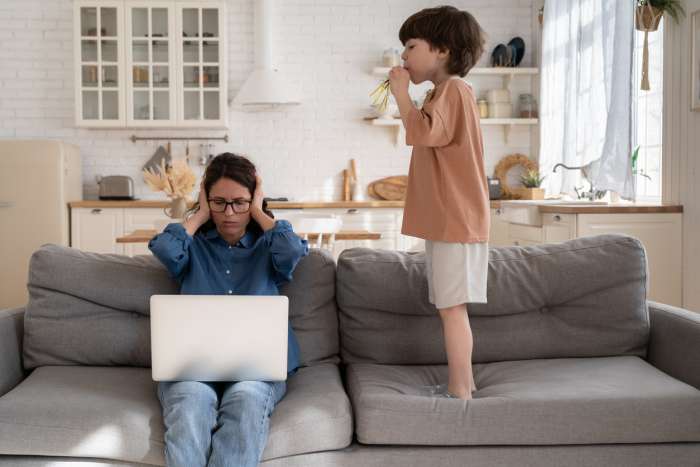As a parent of an intelligent child with combined presentation ADHD, I can shout a resounding yes that children with ADHD can do beautifully at school but still struggle with many tasks at home.
This is not to say that they won’t have off days at school and perfectly marvelous moments at home, but there is a science behind why all children save their worst behavior for home, and often mom or the caregiver their around the most. So, it's essential parents don’t get down on themselves and their parenting if their child who receives rave reviews at school comes and seemingly becomes a monster.
ADHD, or attention deficit hyperactivity disorder, is a mental health condition or learning disability that results in impulsive behavior, difficulty paying attention, fidgeting, and potential behavior problems at school and home.
Children with ADHD need to learn self-regulating techniques and may require medication to keep their behavior and impulsivity in check. But the good news is a diagnosis of ADHD by your child’s pediatrician or mental health expert can be beneficial to your child and should be viewed in a positive light.
It will inform you and your child’s teacher about what is causing their inattentive and possibly poor behavior and help your child understand that their brain works differently.
It also opens doors for your child to receive a 504 plan or IEP (individualized education plan), receive helpful interventions at school like extra test time, or have the freedom to use fidgets in the classroom.
20 Best Gifts for Kids with ADHD (Age-By-Age Guide)
Buying a toy for a child with ADHD who struggles with sitting still during play can be a challenge. But there are tons of great gift ideas for kids and teens with ADHD that are fun, relaxing and educational. Read More
Understanding ADHD or any learning disability is the first step in creating a toolbox to make your child successful! But, no matter how many tools you put in place, your child will likely save their best behavior for school rather than home.
Why is My Child Well Behaved at School But Not at Home?

There are quite a few reasons your child is likely better behaved at school than home, and many of them stem from the social construct that one always behaves their best in public. Chances are you save some of your less endearing behaviors for home.
Additionally, we, as humans and children especially save our worst behavior for those we trust the most. This is because we feel safe and secure around these individuals and understand that while not always appropriate, lashing out at our safe people won’t cause any permanent damage to the relationship.
There is also research-based evidence that children generally are more poorly behaved than a generation ago. According to Katherine Reynolds Lewis, certified parent educator, there are a few reasons children today have poorer behavior than previous generations. First, there needs to be more community and family employment or involvement. Second, the way they play has changed, mainly too much technology and not enough social interaction, and third, their play includes little to no risks, aka they’re not learning to problem solve.
Another reason your child’s behavior is better at school is that the learning environment is typically highly structured and routine. Children and teens thrive on routine and boundaries, even as they rebel against them. Boundaries and structure show children we care about them.
Your child’s school probably excels at creating routine and structure because they need it to function. A child knows when to expect when they enter the school building each time; there are few, if any, surprises.
Children tend to act out when they don’t feel safe and secure. Likewise, if your home environment doesn’t provide structure and a sense of routine, ADHD kids are more likely to struggle and have tantrums.
A final reason your child is acting out more at home versus school is that they’ve spent all-day controlling the wiggles, the outbursts, and trying to pay attention. They can finally release that valve and let it all out when they get home. Additionally, if your child takes morning medication, it may wear off as dinner and bedtime approach.
Even if your child takes medication, you and they should learn effective non-medicated ADHD treatments to combat the evening struggles as they appear.
Tips to Help Your ADHD Child at Home
The most important things a parent can provide a child with ADHD at home are structure, routine, patience, empathy, and accommodation.
ADHD thrives on chaos. A child with ADHD struggles to maintain focus and attention, is easily distracted, and typically is behind their peers in social skills. However, a child with ADHD is not less intelligent; they just need a calm, structured environment to let that intelligence shine.
To help your child’s behavior at home, create a schedule and stick to it as best as possible. Minor variations are ok for most kids; for example, if you say dinner will be at 6 pm, but one night it’s not ready until 6:10, things will probably still go smoothly.
There should be a scheduled time for relaxing right after school. Children with ADHD will struggle if they're expected to do more schoolwork the moment they get home. Of course, if your child is involved in activities like music or sports, the only time you may have for homework is right after the school day, but try to provide them a break of at least 30 minutes.
Children with ADHD will also need breaks during homework sessions and a quiet place with no distractions to complete their work.
There should also be a set time for dinner, bathing, and showering if they still need that reminder, and they should be off electronics a minimum of 30 minutes to an hour before bedtime.
Even high school students with ADHD need structure at help at times to stay on track. A common symptom of ADHD is hyperfocus. When a child becomes hyperfocused, they can quickly lose track of time gaming, building a new LEGO set, or attempting to master a new skateboard trick.
Younger children may benefit from a picture schedule, and tweens and teens can benefit from a schedule they can check off tasks as they complete them.
Providing opportunities for your child to take control of their routine will give them a sense of accomplishment and build their self-esteem.
Children with ADHD often benefit from behavioral therapy. Talk with your pediatric office or the school resource center to see what options are available for your child. In some cases, children receive therapy in the school setting.
Can A Child with ADHD Do Well Academically At School?

A student with ADHD can thrive in private and public schools if suitable accommodations and tools are in place.
ADHD is classified as a learning disability and, as such, falls under certain protections the ADA (American Disability Act) offers. In addition, even if your child does not qualify for special education classes, a diagnosis of ADHD provides them access to a 504 plan which allows accommodations to combat symptoms of ADHD.
A 504 plan is reviewed once per school year around the anniversary of its induction. Typically the school principal or assistant principal, school counselor, the child’s new and possibly previous teacher if it is the beginning of the school year, and the parents are involved in the meeting.
Typical accommodations a child with ADHD may have access to include:
- A standing desk
- The use of fidgets or sensory toys
- Movement breaks
- Extra time for tests or in-class assignments
- Access to study guides or teacher-prepared notes
- Specified seating placement
- Pencil grips highlighted paper and graphic organizers
- Reduced workload
- Specialized assignments (oral versus written, for example)
- Specialized helper roles in the classroom
If you feel as if your child’s IEP or 504 is not being followed at school, communicate with the school and, for upper grades, teachers individually and open a line of dialogue.
Types of ADHD
The types of accommodations your child receives at school and tools for at home will depend on the type of ADHD they have and their specific needs.
There are three types of ADHD:
- Inattentive type
- Hyperactive-impulsivity type
- Combined presentation
Inattentive type
- Easily distracted
- Become bored quickly
- Appear not to listen to directions or conversations
- Move slowly or as if they are daydreaming
- Difficulty following directions
- Often lose items
- Miss details
- Process information more slowly
Hyperactive-impulsivity type
- Squirm, fidget, and appear restless
- Interrupt frequently
- Difficulty sitting or standing still
- Impulsive and impatient
- Talk constantly
- Blurt out comments or answers
- Make inappropriate comments
- Touch things frequently need to use their hands
Combined presentation
Most people have a combined presentation, which means they present a mixture of symptoms from the inattentive and hyperactivity-impulsivity types. Symptoms can also change, and new ones can develop or disappear.
ADHD does not have to be a death sentence to your child’s school career. In fact, it can be quite the opposite. A diagnosis empowers your child because it allows them to learn more about themselves, how their brain functions, and the best ways for them to learn.
A child with an untreated learning disability is likelier to act out in school and at home, struggle academically, have lower self-esteem, and engage in risky behavior.
Children and teens with ADHD can thrive in school academically and socially with the proper tools. Of course, the home will always be their safe spot, so don’t be surprised if there are more struggles, but providing a structured routine at home will reduce behavior battles and aid your child’s overall success.
For more information on ADHD and resources, check out ADDitude and CHADD.



